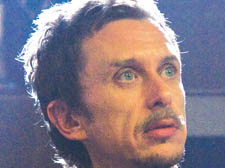|
|
 |
| |

Matt King plays Cookie in the film |
Get real! Mockney
Ritchie’s roll is over
ROCKNROLLA
Directed by Guy Ritchie
Certificate 15
ROCKNROLLA is exactly what you’d expect from a Guy Ritchie movie: Lots of Mockney patter between chunky men with clever nicknames, some punch-ups and gun-slinging and a burning desire within each character to get rich as quickly and as crookedly as possible.
But Rocknrolla lacks the charm or energy of Lock, Stock and Two Smoking Barrels or Snatch, and perhaps one of the reasons this falls down so badly is Ritchie is not ensconced in the world he is trying to portray.
Hardnut gangsters? I don’t believe that Mr Madge spends lots of time hanging out in East-End dives with fellows running protection rackets. Nor do I believe (and of course I may be wrong) that he has many contacts addicted to the crack, which also plays a role in the plot.
Then there is his attempt to loosely base his gangster banter tale around London’s property developers, their relationship with local councillors and how projects get the nod. Ritchie visiting late-night Town Hall planning meetings? I think not. So it all has this air of how he believes it might look and feel, and frankly it’s not that convincing.
The gangsters are like East End comics, the crackhead is toned not trampy and the idea that one councillor can push through any whopping great tower block he wants is just nonsense.
Plot-wise, it’s a mish-mash of heists, stolen property and bungs. There is a twist at the end but it bears no relation at all to what has come to pass.
The tale roughly goes like this: A moneybags Russian criminal wants to build a huge tower block and decides the best way to ensure he gets planning permission is to bring on board London crime ringleader Lenny Cole (a gruff-talking Tom Wilkinson), a typical Cockney hardnut who has a planning councillor in his pay, and can therefore make such bids go smoothly.
Our Russian friend lends Lenny a painting while they are doing a deal.
But the painting disappears, stolen by Lenny’s estranged stepson who happens to be a world-famous rock star and who is also a crack/heroin addict. Cue a chase to recover the painting.
Here the story runs through a number of different strands, creating one big fat tangle of a mess. Ritchie believes doing this is clever, and, granted, such multi-layered storytelling in Lock, Stock and Snatch, worked. But here it’s a big, soggy pool of cold spaghetti.
There are some very dubious tough-nut jokes. One of the firm, Handsome Bob, is about to get a five-year prison sentence, and it emerges that on his last night of freedom, he doesn’t want to spend it with a large bag of cocaine and two dollybirds.
He is, he ashamedly admits, actually gay and wants to cuddle his best gangster friend. Cue dubious homophobic comments and some cheap pokes at his sexuality. Not big, not clever, not funny.
Grow up, Ritchie.
Dubbed an action comedy, it has two immediate problems: there is very little funny about it and little crash-bang-wallop in terms of action.
Above all, this film portrays a London that is hard to believe really exists: It’s a London that is the figment of the imagination of people who see little else but the four walls of trendy private members clubs.
It is claimed Ritchie is back on form. But the zeitgeist for Snatch et al seems to have passed and Ritchie hasn’t realised it. |
 |
|
 |
| |
|
 |
|

